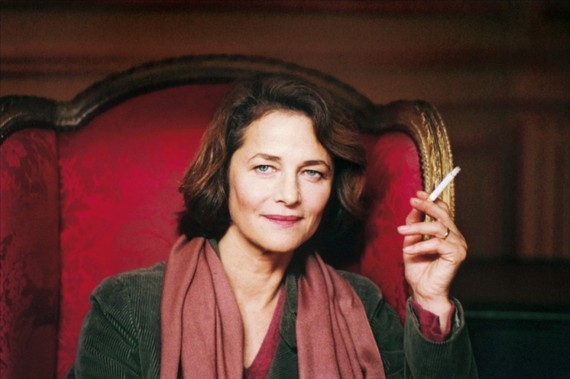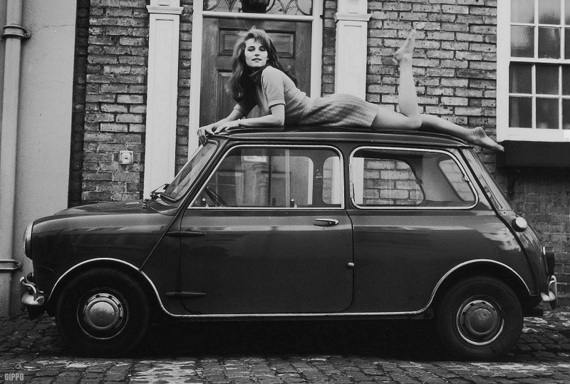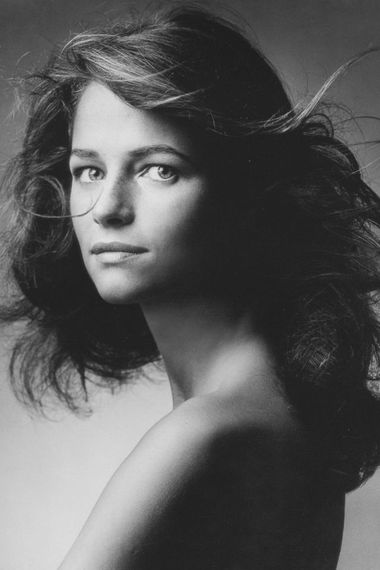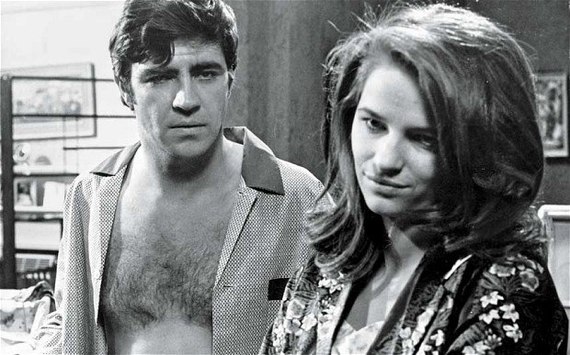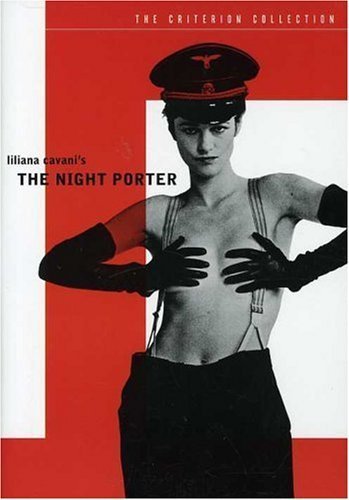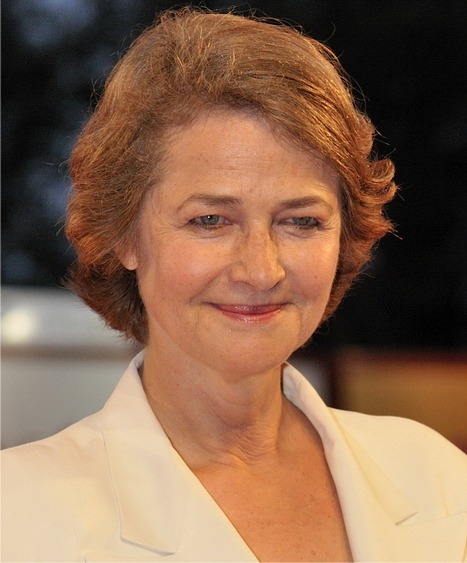One of the joys of being an entertainment journalist is not only getting to meet some of your childhood heroes, but your earliest crushes, as well. Charlotte Rampling was, for me, one of those very crucial women who made me realize at a certain age I definitely liked girls. The movie was Orca, one of her lesser efforts, but the moment she graced the screen, it was as though I had been pulled into a vaccum. When I got to sit down with her nearly 25 years later, I had to smother the butterflies in my stomach that threatened to regress my 34 year-old manhood into that of a ten year-old boy again. Fortunately, I caught my breath. But just barely.
This article originally appeared in the June 2001 issue of Venice Magazine.
Often compared to Lauren Bacall for her cat-like beauty and femme fatale movie roles, Charlotte Rampling has been illuminating the world's movie screens (and giving its male members heart palpitations in the process) for nearly 40 years. Born in Sturmer, England February 5, 1946, the daughter of a British colonel and Olympic gold medalist who later became a NATO commander. Rampling and her older sister spent part of their childhood in France, educated at the prestigious Jeanne d'Arc Academie pour Jeunes Filles in Versailles and later at the exclusive St. Hilda's school back in England. Rampling initially entered show biz as a model, then won a small role in Richard Lester's The Knack and How to Get It (1965). The following year brought triumph and tragedy to Rampling: a star-making turn in the hit film Georgy Girl and the suicide of her older sister.
Determined from then on to do something meaningful with her life and abandon the "frivolous," Rampling turned down the dozens of "dollybird" roles offered to her and was cast as the young wife of a Nazi industrialist family in Luchino Visconti's controversial and sensational epic The Damned (1969). Her taste for provocative material continued from there, reaching its zenith with her role in The Night Porter (1974), a twisted tale of a concentration camp survivor (Rampling) reunited with her former Nazi lover ten years after the war's end. This highly controversial (and at the time, X-rated) film catapulted Rampling to international stardom, becoming a sort of thinking man's sex symbol. Her role in John Boorman's cult sci-fi film Zardoz (1974) opposite Sean Connery helped to solidify this status.
Rampling continued to work extensively in Europe, coming Stateside for memorable turns in the Philip Marlowe mystery Farewell My Lovely (1975) opposite Robert Mitchum, the Jaws rip-off Orca (1977, which she cheerfully admits "I did for the money"), Woody Allen's suicidal girlfriend in Stardust Memories (1980), and Paul Newman's whistle-blower lover in Sidney Lumet's The Verdict (1982).
Following her marriage to French composer Jean-Michel Jarre (son of legendary film composer Maurice Jarre), Rampling relocated to Paris and worked steadily in French and European productions throughout the 80s and 90s, doing an occasional part in American productions such as Angel Heart (1987) and Wings of the Dove (1997). Perhaps her most notorious, and in many circles most lauded, effort during this period was Nagisa Oshima's Max My Love (1986). Written by Luis Buñuel's frequent collaborator Jean-Claude Carierre, Max was the blackly comedic story of a woman having a passionate love affair--with a chimpanzee! Rampling got raves from all who saw the film, which got shoddy distribution on this side of the pond.
Rampling's latest effort is Under the Sand, directed by enfant terrible filmmaker François Ozon. In it, Rampling plays Marie, a woman whose husband of 25 years, Jean (Bruno Cremer), disappears during a casual swim in the ocean while on holiday. With no body present to confirm his death, Marie continues the relationship in her mind, having long talks with Jean, pouring him coffee in the morning, and so on, much to the consternation of concerned friends and a new man who wants to enter her life. A major hit in France, Under the Sand is a powerful film full of emotion and understatement, and is a breathtaking showcase for the incandescent Rampling. It is currently playing in selected theaters.
Charlotte Rampling is still every bit as beautiful today at 55, as she was when she made her screen debut 36 years ago. A refreshingly candid woman with an infectious laugh and charming sense of humor, Rampling continues to make her home in Paris, where she is currently separated from Jarre. She met up with Venice recently during a brief Los Angeles stay to promote Under the Sand.
The role of Marie in Under the Sand must've been a terrific part for an actress since you were able to express so much without dialogue.
Charlotte Rampling: Yeah, I was able to express a great deal through other mediums. So much of it was just "being there."
Was it difficult to go to some of those places, those lonely places?
I suppose it was, but you don't think about it at the time. It's usually afterwards that it hits you, then it goes away after a few weeks. But while it's happening you know that you have to go there and you just do it.
I saw in the notes that there was a six month break in the shooting between the film's two halves. Was it tough coming back after that long a hiatus?
No, it wasn't. When I first met François Ozon, he wanted to shoot the first part where the husband dies, then stop shooting and work on the screenplay with me for three months, and then film the second part. But, (laughs) because we had such money problems, nobody wanted to finance a film like this, it went on a bit longer. So in the end, it was all part of the process.
It sounds like you had a lot of input in the script. Is there a lot of you in this character?
Yeah, there is a lot of me. Not specific, but a lot of the way I am. There's a great deal of dichotomy in her character, and in me, and in all of us, and as actors, we bring that out. We expose what we all have lying dormant: the grief feeling, the loss feeling, the feeling of being abandoned which we all have and have had at one time or another. Those feelings can be very terrifying. In this film, we create a situation where you do actually feel that. You have this situation where a husband disappears but there's no body, but how do you make the audience feel what Marie is going through afterwards? I think that's what people think about a lot when they see this film, because it could happen. To any of us. At any time.
You now live in France and lived there as a child, as well?
Yes, my father was in the army and was posted at Fontinbleu. That's why I'm still able to speak fluent French. He put my sister and I in French school, kicking and screaming the whole way. We hated it! Nobody spoke English and we couldn't understand a thing anyone was saying. And it was a convent, and we weren't Catholic, we were Protestant. So we just sat! (laughs) Then when I married Jean-Michel I settled in France in '78.
How did you become drawn to the arts?
Completely coincidentally, in a little show in the suburbs of London where I lived. I would put on little comedy shows with my sister and other people, and we did a little thing singing in French since we just got back from France. And everybody loved it and it all got quite good! So I got carried away by it all and thought 'Well, obviously I'm going to be a cabaret singer.' Well, obviously my father said 'no way,' put me in school and that was that. Then some time later, in one of those funny stories, someone saw me on the street and put me in Richard Lester's film The Knack. From then, things just sort of took off.
You were already modeling by that point, right?
Yes, although I was a rather hopeless model. I only did it for six months. I wasn't the look at all, at that time. The look was like Jean Shrimpton, Twiggy. I have these sort of heavy, slanted eyes, more of a 1940s look that they tried to put in these 60s fashions, and it just didn't work.
Georgy Girl was the movie that put you on the map. Tell us about that.
I got the screenplay and read it and thought (my part was) just one hell of a horrible girl! (laughs) I was actually hated after that by many people for a really long time. I was very upset. I wanted to be liked, and I played this bitch with such conviction that nobody would cast me after that! (laughs) They were all convinced I was this downright, complete bitch! (laughs) I got completely typecast after that, throwing my baby away in the hospital. I mean, that was outrageous, wasn't it? "Here, take it! Free, gratis and for nothing, with none of the pain and discomfort. Instant family!" Quite a line! But I loved playing that film, because that's when I realized that I had a really wicked alter ego, and that one was the one that was more interesting to use in cinema. I always sought out roles after that which were a bit left of center.
The next big film you did was Visconti's The Damned.
Yeah, the reason I went off to Italy after that was, it was all sort of "dollybird" roles in British cinema, you know? It was all about being pretty and lighthearted, and it wasn't about grit anymore, because we were finished with kitchen sink drama by that point. I wasn't too suited to the whole "mod" thing. Doing The Damned then put me into a whole new "theater of life," so to speak. (laughs) Visconti was really like my master, or mentor. I didn't even know who he was, or what his kind of cinema was all about when I met him. I was a very young, very uneducated person. I had not wanted to study anything. I said to him "I don't think I can play this role. She's in her 30s, has kids and a family and I don't even understand this story..." Visconti says "I will dress you. I will make you up. I will turn you into this character. You will be absolutely exquisite! And you will play for me!" (laughs) "You have it. It's all here. You have to imagine that you are this woman, because you are every woman!" (laughs) So he really became my mentor.
You did John Boorman's Zardoz after that, which has a strong cult following, although many people are still baffled by it.
Some people think that Zardoz is the film. It's a cult film beyond cult films. I loved it. It was so wacky. I had no idea what we were doing. Everybody was just doing weird things in these weird costumes. Nobody knew what they were doing! (laughs) It was great.
What were Boorman and Connery like to work with?
John was wonderful, like a naive poet who's illuminated by the Grail, by this mystical journey. He's a wonderful man. I just saw him again recently. He's very sweet. And Sean, well...Sean is Sean, what can I say? (laughs) I prefer Sean on-screen to off-screen. 'Nuff said.
The next film that really established you as a serious actress was The Night Porter. That was the second film, after The Damned, that you did with Dirk Bogarde. Did you get to know him well?
Yes, very well, we remained very close friends until his death. He was the reason that I got The Night Porter. He said he wouldn't do it without me. He'd had the screenplay for some time and hadn't wanted to do it. Then one day he saw one of (director) Liliana Cavani's films on television and decided that he was ready to make it. If you ever read any of Dirk's books, then you got to know him. His books are absolutely who he was: a renaissance man, a real gentleman.
Tell us about the experience of doing The Night Porter.
What can I tell you? It was hell. I knew it was something I wanted to do, but when you're younger, you don't really think about any other implications, you know? I had just had my first son, and then suddenly three months later, I had to sort of put him in his basket, go off to Rome and make this film. We started with the concentration camps scenes because she wanted us to get right in there, and she was right. There are some films that just sort haunt you forever. The Night Porter was one of those, I think, as is Under the Sand.
Farewell My Lovely was a wonderful film. How was Mitchum to work with?
He was a fantastic man. He tried to hide everything about himself that was good, and tried to come off like this huge badie, (laughs) but was really a very sensitive, very fine man, which I saw little bits of when he wasn't fooling around too much with the actor who played Moose Malloy. (laughs) (Doing Mitchum) "I'm lookin' after Moose!" And they'd be in some bar down the beach getting drunk!
You got to work with Woody Allen in Stardust Memories, playing a character that was so different from most of your other portrayals, so fragile. Tell us about Woody.
Woody called me and offered me the part, and I'd just given birth to my other son, and I didn't think I could do it. We eventually worked something out, where I could work on and off for five months, because he was taking a very experimental approach to making this film, very impressionistic, so it was a brilliant way to work. He was in an interesting place himself personally at the time, having just broken up with Diane Keaton, and wasn't yet with Mia. So being in between, he was in a very interesting place creatively. When he cast me, he said he wanted my character to be his ideal woman, and made this whole sort of game around this fact and how do we make her Woody's ideal woman. What I learned was that for Woody, the ideal woman was someone who was absolutely nuts 27 days out of the month, and for the rest of the time, is so perfect, lovely and charming that you can't resist her. (laughs)
The Verdict. Tell us about Lumet and Newman.
We rehearsed that for two weeks in a studio in New York. Sidney likes to rehearse all his films completely, almost like a huge dance rehearsal. We all knew what we were doing, so that when we shot, we went really fast. Lumet's an amazing director, just the way he handles the job of directing. Once rehearsal was over, we were all on our own, which is fantastic. You've been through all the sort of teething problems, and you're okay, so you can just get on with your acting. It was one of the most coherent shoots I've been on in terms of the most complicated scenes just being completely there. With Newman, it was a really extraordinary role for him, and a risky role in many ways, playing this guy having to come to terms with all the demons. He was a sweetheart, absolutely sweet.
You've been working in Europe almost exclusively for the past decade.
No, I really wanted to go underground in a sense and wanted to stay close to home. There's less "business" in European show business. It's more of a community. It's not as competitive there as it is here. The stakes are much less in Europe. Here, the stakes are so high. I mean, nobody in Europe gets $20 million for doing a film! It's manageable in Europe. Nobody wants to rape, and smash and kill to make a deal there. Here, I don't know how these people manage their situations, I really don't. The other reason I've stayed close to home is that I had three kids to raise, who are now grown, and didn't want to miss out on their childhoods anymore than I already had. My son Barnaby wants to be a director and he's making shorts, directing music videos. He lives in London. My son David is a magician, who used to practice on us at home, and my daughter Emilie works as a fashion accessories designer.
What's next on your slate?
A comedy! At last, image that! Back to my roots! Michel Blanc, an actor-director, has written a film called See How We Dance, which is an ensemble piece about these characters that sort of tango in and out of each others' lives. I've also got a film called Signs and Wonders that should be coming out in the States very soon.
You obviously enjoy other things aside from acting. What is your life like in Paris?
Well, I'm very contemplative. I love to sort of be around my life. It's not all that interesting, but it's something that I need to do in order to move on and to keep going. I have to sort of go away from the bright lights so that I can actually survive and come back, and I have come back, so it's great! Otherwise you get completely emptied out, and there's nothing left in there.
